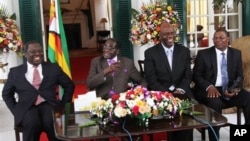HARARE —
Leaders of Zimbabwe's main political parties said Thursday they have agreed on the contents of a new constitution, though it is not yet clear when a referendum on the document, whose passage would pave the way for elections to end the country's fragile, four-year-old coalition government, will be held.
Zimbabwe's two main political parties, ZANU-PF and the Movement for Democratic Change [MDC], have been at odds for months on the text of a new constitution, a draft of which was released last July by a parliamentary committee.
“We are glad to say that we have now come to the conclusion of the exercise and all parties are ... generally agreed and the finalization of the draft is now being made," said President Robert Mugabe after meeting with Prime Minister Morgan Tsvangirai. "We have at last come to the end of this marathon exercise.”
Mugabe heads the ruling ZANU-PF party while Tsvangirai heads the MDC party.
The drafting of the country's prospective constitution began in 2009, when Mugabe and Tsvangirai formed a power-sharing government following violently disputed elections. The draft constitution, whose potential completion many doubted, is more than two years behind schedule, its composition delayed by partisan disagreements over numerous issues, including the extent of presidential powers.
Tsvangirai described Thursday’s breakthrough as very important.
“We have reached a defining moment for the country," said Tsvangirai at a press conference. "I am sure our people’s patience has been tested severely. This concludes a long journey that we have travelled in trying to reach this national process."
If ratified, the new constitution would replace the one in use since 1980, when Zimbabwe won independence from Britain. Regional leaders called for a new constitution in order to ensure credible national elections after the 2009 formation of Harare's current coalition government.
When asked to talk about sticking points in developing the new draft constitution, Mugabe emphasized the need to look forward and not dwell on prior disagreements.
"Let us not look at what the difficulties were. Those are now part of our history," he said. "We want them forgotten.”
Mugabe said he would announce the planned time frame for the referendum in a few weeks.
Zimbabwe's two main political parties, ZANU-PF and the Movement for Democratic Change [MDC], have been at odds for months on the text of a new constitution, a draft of which was released last July by a parliamentary committee.
“We are glad to say that we have now come to the conclusion of the exercise and all parties are ... generally agreed and the finalization of the draft is now being made," said President Robert Mugabe after meeting with Prime Minister Morgan Tsvangirai. "We have at last come to the end of this marathon exercise.”
Mugabe heads the ruling ZANU-PF party while Tsvangirai heads the MDC party.
The drafting of the country's prospective constitution began in 2009, when Mugabe and Tsvangirai formed a power-sharing government following violently disputed elections. The draft constitution, whose potential completion many doubted, is more than two years behind schedule, its composition delayed by partisan disagreements over numerous issues, including the extent of presidential powers.
Tsvangirai described Thursday’s breakthrough as very important.
“We have reached a defining moment for the country," said Tsvangirai at a press conference. "I am sure our people’s patience has been tested severely. This concludes a long journey that we have travelled in trying to reach this national process."
If ratified, the new constitution would replace the one in use since 1980, when Zimbabwe won independence from Britain. Regional leaders called for a new constitution in order to ensure credible national elections after the 2009 formation of Harare's current coalition government.
When asked to talk about sticking points in developing the new draft constitution, Mugabe emphasized the need to look forward and not dwell on prior disagreements.
"Let us not look at what the difficulties were. Those are now part of our history," he said. "We want them forgotten.”
Mugabe said he would announce the planned time frame for the referendum in a few weeks.
